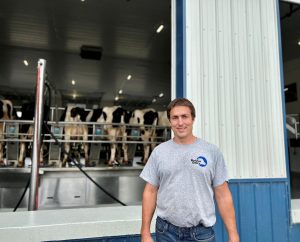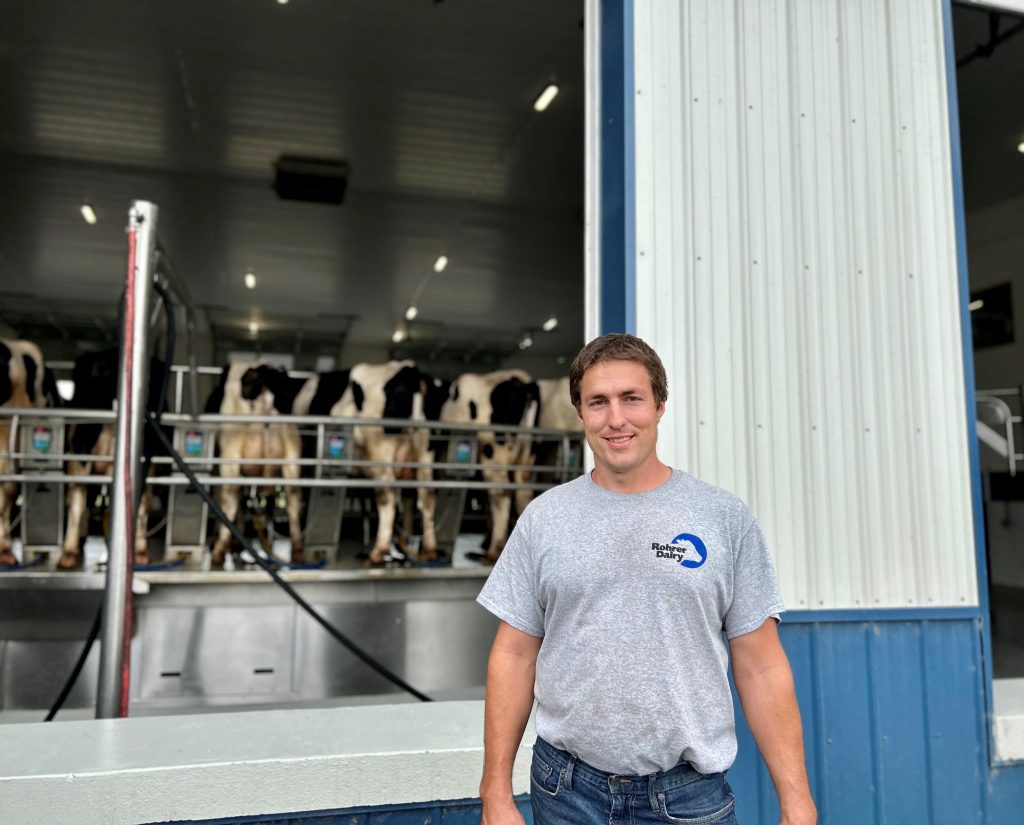
Tyler Rohrer Was Interviewed in the New Episode of “Cow-Side Conversations”
In the Center for Dairy Excellence’s latest episode of the “Cow-Side Conversations” podcast, Tyler Rohrer of Rohrer Dairy Farms in Lancaster County, Pennsylvania shares what the expansion decision-making process looks like. He describes how his family made the decision to invest in a 60-stall rotary milking parlor and expand to milk 1,600 cows. From milking more cows in less time to a healthier overall herd, Tyler shares some of the benefits and competitive advantages to their new set-up. He also opens up about the hurdles and timelines that are part of any major dairy expansion project.
Tyler opens the podcast by sharing the history and current scale of their dairy operation. In 1956, his grandfather started a herd of about 20 cows. In 1973, he decided to install an eight-stall carousel milking parlor and grew to a couple hundred cows. In 1983, they reinvested in the dairy business again and expanded to a double 10 milking parlor. When the second generation – Tyler’s father Robert and uncles Mike and Tony – joined the business in the 90s, they built a double 20 herringbone parlor and continued to grow. Tyler is part of the third generation of the family operation, joining the family business in 2021 after selling produce for several years.
Today, the Roher family has a 1,700-cow herd and keep all replacements on site. Their team consists of six full-time family members and 12 employees. Tyler oversees all the maintenance in the rotary parlor and herd work.
The decision to expand their herd and invest in a new rotary parlor started in 2016. Tyler’s dad was noticing wear and tear with their parlor and knew it was time to upgrade. Their goal was to keep the operation efficient, and they liked the way rotary parlors milked cows. Through family meetings between generations and conversations with outside consultants such as engineers, builders and accountants, it was about a three-year process once they started breaking ground.
“It became evident that they needed to talk to the next generation and see what the interest was moving forward. We worked through some of those things for a couple years,” Tyler shares in the podcast. “Then, in 2019, we started the process with engineering, permitting and building. It took a year of straight construction until we were milking cows. Now, we’re 10 months in and starting to breathe again.”
The Rohrer family chose to install a stainless Madero deck with lab equipment that could help them hone in on herd health.
“I like the simplicity and durability of the stainless deck. The lab equipment alone spoke volumes to me in terms of herd health and getting a full picture of the cow. It collects butterfat, protein, and blood readings. It knows ketotic cows. That played a big role for me,” Tyler adds.

With the expansion, they also built a new free-stall barn that has slotted floors. Tyler says they have relied on slotted floors for years, instead of lagoons or ponds for manure, to help enhance efficiency.
“The slotted floor barns have worked really well for us. We have enough land to put our manure on. Everything is really close, so it’s convenient. We do all of our own fieldwork, and we need to be efficient with it. The slotted floors have established that for us,” he explains.
The new barn has also led to less overcrowding with more space to raise all of their own replacements.
“With our expansion, we built one new free-stall barn with the rotary. That has allowed us to comfortably space things out. We have a lot of room for our pregnant heifers, so we haven’t had to do any custom raising for our heifers [with the new space],” Tyler adds.
With the rotary parlor, Tyler says it has led to more consistency for their herd and the cows became comfortable with the new milking set-up after only a few months.
“The rotary has been more comfortable for the cows. The environment is quiet, steady and consistent. I think that consistency just gets you a healthier cow at the end of the day,” he says. “It’s amazing that it can go as seamless as it has even just after eight to ten months.”

In addition to herd health benefits, the rotary parlor has improved the family’s time management and labor management. They are able to build a better environment for their employees.
“It has helped free up a couple areas for our family, so we’re not overrun at the end of the week. Our employees are also milking 30-40 percent more cows in an hour less time. It’s really going well and we know there’s room to improve that,” Tyler shares. “Our employees are also pitching in and doing other tasks on the farm. It has been beneficial on the labor and family side of things.”
While the expansion and rotary parlor have increased efficiency on their operation, Tyler describes some of the hurdles throughout the podcast – including what to expect with permitting, financial planning and more. He shares two of the biggest challenges during this type of expansion project:
- Uncertainty. “We were in the middle of permitting and got to the point of moving dirt when COVID hit. The supply chain became a big issue. We saw it affect certain areas more than others, but there was a lot of uncertainty. Our cooperative put in some base restrictions, so our bank was a little worried. There were a lot of questions, and we just had to work through them one at a time.”
- Financial planning. “We were leaning on [our] competitive advantage some, but trying not to be foolish. We knew we were taking on a lot of debt, but that’s where the accountants were able to put projections together for the bank with assurance that things were still going to be in a good position. There was a lot of planning.”
Since then, some of their cooperative’s base restrictions have been lifted, which could allow them to become even more competitive in 2024. Tyler says a herd size of 1,900 would be the biggest they would grow to right now. While they have a permit for another barn, they are waiting until interest rates settle down to move forward with an additional investment.

“We’re ready to milk more cows. The rotary has definitely been more efficient than we were expecting. But right now isn’t the time to borrow money with these high interest rates. If we establish come cash in the next year or two, hopefully by 2025 we can be doing some more,” he shares in the podcast.
The expansion paved the way for Tyler and his cousin to have an ownership share of the operation. That transition process was part of the discussions leading up to the expansion. Tyler says making sure all family members are in frequent communication and surrounded by a team of consultants can help with an expansion project of this scale.
“If you have multiple generations or family members involved in your operation, there needs to be open and honest communication. There needs to be commitment. Any dairy farmer knows that you’re not in the dairy business for just five or 10 years. It’s a long-term commitment, and it doesn’t work well if it isn’t like that,” he says. “Having people consult you in different areas is a good thing. You need to have a good team, whether it’s engineers or builders or accountants, that know the project and what’s involved. You have to know what you’re getting into.”
To listen to the full podcast interview with Tyler, visit www.centerfordairyexcellence.org/podcast. The podcast is also available on Spotify, Apple Podcasts, and Amazon Music. With a new episode released each month, Tyler’s interview is the 11th episode in the third season. The podcast was designed to share real-time farmer insight, tricks of the trade, and inspiring stories from dairies across Pennsylvania.

